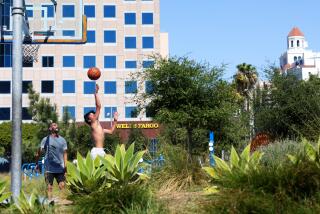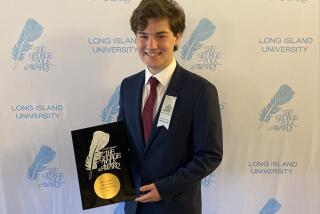Al Delugach, Pulitzer-winning investigative journalist, dies at 89
Al Delugach, a lightning-fast newspaper “rewrite man” and relentless investigator who defied his own publisher to help expose rampant corruption in a St. Louis labor union in the 1960s, has died. He was 89.
Delugach died Sunday at his home in Los Feliz of mesothelioma. Family members believe he contracted the incurable form of cancer from asbestos exposure during his service in the U.S. Navy during World War II.
Delugach’s long journalism career ended with nearly two decades at the Los Angeles Times, but former colleagues said that his work in St. Louis — where he shared the 1969 Pulitzer Prize for local investigative reporting — epitomized his integrity and grit.
Delugach and fellow reporter Denny Walsh of the St. Louis Globe-Democrat spent three years investigating the Steamfitters union, Local 562. In more than 300 stories, they revealed a pattern of labor racketeering that led to multiple federal indictments for a kickback scheme related to the sale of insurance to the union’s pension fund.
The reporting duo ran into a major obstacle when a new publisher, G. Duncan Bauman, arrived in the midst of their project. Bauman found fault with their coverage and killed a key story — about the federal government quashing its criminal prosecution of the kickbacks. Walsh then took the unorthodox step of leaking the story to a competitor at the Wall Street Journal.
The subsequent coverage led the Justice Department to reverse its decision and pursue indictments against the Steamfitters bosses and others. The federal prosecution, in turn, highlighted the painstaking work Delugach and his partner had done over many months, leading the Pulitzer judges to acknowledge their crusade for rooting out “fraud and abuse of power.”
Delugach soon left the paper for the rival St. Louis Post-Dispatch but quickly became disillusioned when his new employer ran an editorial rebuking coverage of corruption at City Hall. His friend Walsh had written the critical story after moving on to Life magazine.
“It was really an insult for them to come out with that attitude in print,” Delugach said, decades later, of the editorial denying that Mayor A.J. Cervantes Jr. had ties to the underworld. “I took it very personally. I figured there was no future [there] for me.”
He quit the Post-Dispatch and soon moved to Los Angeles, where he spent the last 19 years of his career.
The Times put Delugach’s high metabolism, writing panache and investigative chops all to good use. Among many other topics, he covered record industry payola, the machinations of “junk bond king” Michael Milken and mob influence in Las Vegas.
His old reporting partner, Walsh, recalled how preternaturally cool Delugach remained under the pressure of deadline, weaving a hodgepodge of facts from sources and colleagues into compelling stories, in the manner of the best rewrite specialists. Walsh recalled an editor who once said: “No matter what you dictate to Delugach, he makes it sing, dance, whistle and do flips.”
A highlight of his years in Los Angeles came when he and Times colleague Ronald Soble won a prestigious Gerald Loeb award in 1984 for their coverage of the death of highflying gold trader Alan D. Saxon. Delugach retired in 1989.
“Al Delugach was such a superb journalist — enormously capable of finding crucial details while keeping his eye on the bigger picture,” said Robert Gottlieb, an Occidental College professor and author of “Thinking Big: the Story of the Los Angeles Times.” “For myself and for many others who came to appreciate his work, and his friendship, he was the very model of the effective and persevering investigative journalist.”
Born in Memphis on Oct. 27, 1925, Albert Lawrence Delugach left high school in 1943 to join the military. The Army wouldn’t have him because of poor eyesight, so he signed on with the Navy. After the war, he earned his high school equivalency degree, then majored in journalism at the University of Missouri. He joined the Kansas City Star in 1951, launching his nearly 40-year career in journalism.
Delugach ran his first marathon at age 50 and several more after that. He hiked regularly in Griffith Park.
His willingness to question authority extended to his personal life. When a junior high school principal tried to tell him his daughter Sharon had a discipline problem because she failed to properly greet her homeroom teacher, Delugach wouldn’t hear of it.
Putting his arm around his daughter, he said: “Stop trying to break her spirit.” Then the two marched out of the principal’s office.
Besides Sharon, a longtime political activist and organizer with the American Federation of Teachers, Delugach is survived by his wife, Bernice; daughter Joie; son Dan; and daughter-in-law Kathryn. Another son, David, died of cancer in 1998.
Twitter: @LATimesrainey
More to Read
Start your day right
Sign up for Essential California for the L.A. Times biggest news, features and recommendations in your inbox six days a week.
You may occasionally receive promotional content from the Los Angeles Times.







